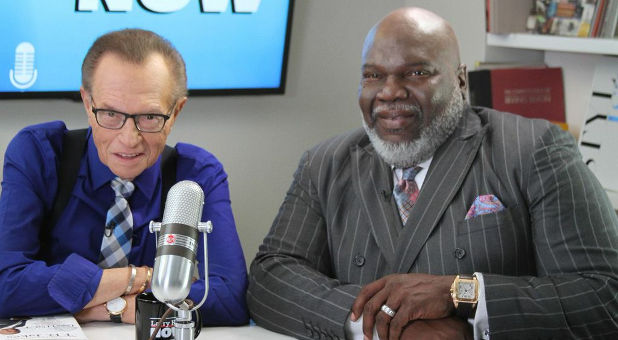Bishop TD Jakes Tells Larry King: ‘Whenever Someone Gets Ready to Run, They Get Religious’
Bishop T.D. Jakes recently joined Larry King for a spirited discussion on race, religion and politics on Larry King Now.
King asked Jakes what he saw to be instinct and why a religious person would advocate following it.
“The people who really shattered the glass ceiling were people who did it from their gut,” Jakes said. “That they did it instinctively, they broke the rules, took the risk and went ahead to be authentically them.”
Jakes further explained that people mistake instinct for emotions, society’s influence and other urges. He defines instinct as “how the manufacturer” (or how God) “made you.”
“Your ability to be artistic or prolific as a writer” might not line up with what you do to make a living, he said, but in some capacity, these “categories” are “what you are designed to do.” Jakes cautions people, “Don’t lose sight of who you are as an individual,” especially when work and family life require us “to wear different hats.”
“‘Busy’ does not mean that you are ‘producing,'” Jakes said, in regard to social media. He argued that the majority of modern technology—from electricity to trains—was “done by people who had moments to think. You’d be surprised what you can hear when you shut up.” He recommended people find quiet and “hit the reset button” to get in touch with their inner instinct and who they really are.
King and Jakes then discussed the prevalence of racism in America—from Paula Deen to Donald Sterling.
“I’m not shocked it by it at all,” Jakes said, “and I don’t think it will ever totally go away. Not only in this country, but in every country, it’s not always over black and white, but it’s always over something.”
“Bottom line is, it’s stupid,” King added. “There’s no baby born a racist.”
“Yes, but that’s part of humanity,” Jakes said. “It’s a learned behavior. It’s also a generational issue. We who are victims of that in any way have to move beyond it.”
King, a nonbeliever and open supporter of the Affordable Care Act (ACA), asked Jakes what he thought of the health care law.
“I do support the ACA,” Jakes said, but he admitted the “critics are right”—that there are “problems” right now, but that those will be corrected moving forward. Jakes feels the ACA is “a starting point” to help people get the care they need.
“What do you think about religion in politics?” King asked. “Obviously they’re supposed to be separate.”
“Whenever someone gets ready to run, they get religious,” Jakes said.
They then discussed the Supreme Court’s decision to expand open prayer.
“The majority said it brings comfort,” King said of the decision, then commented that the minority thought prayer had no place in government.
Jakes explained that he thought the Supreme Court’s decision “acknowledges faith as part of our lives” and that as we become an “increasingly diverse population, policies must accommodate [everyone].”
“I was pastoring after 9/11, and we were running over with people,” he explained. “People stop being offended by a lot of things in time of need.”
King then asked Jakes about faith. “How’d you find it?” he said.
“I believe it like I believe I’m in love,” Jakes replied. “I could never prove to you that I’m in love, but I know that I am. I believe it like I know when I’m in pain. I could never prove to you that I’m in pain, but I know when I am. God is the one thing that cannot be proven. He must be revealed. It is the most personal relationship you will ever have in your life because it lives within your heart.”
“I can see why he’s famous,” King said, partly in jest.




























































